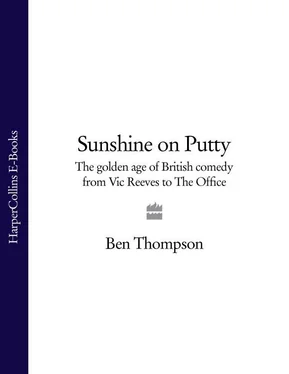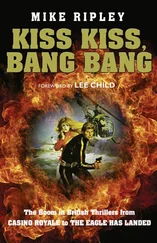The Golden Age of British Comedy, from Vic Reeves to The Big Night Out to The Office

‘Be content to laugh and try not to know why’
Dugas, La Psychologie de rire, 1902
Cover Page
Title Page Sunshine on Putty The Golden Age of British Comedy, from Vic Reeves to The Big Night Out to The Office
Epigraph ‘Be content to laugh and try not to know why’ Dugas, La Psychologie de rire, 1902
Introduction Introduction ‘Comedy has ceased to be a challenge to the mental processes. It has become a therapy of relaxation, a kind of tranquilising drug’ The great American humorist James Thurber wrote those words in 1961. More than four decades later, they sum up – with uncanny precision – the hollow feeling inspired by watching a self-satisfied university graduate entertaining a roomful of pissed-up twenty-somethings with bad jokes about Star Trek. Complacency, escapism, the inability to take anything seriously…These were just a few of the obvious flaws in Britain’s cultural DNA which could be (and often were) laid at the door of an ever-burgeoning comedic community in the last years of the twentieth century. For this was a period during which (in the words of another visiting US wit, Rich Hall) ‘Everyone who didn’t want to lift stuff seemed to become a comedian’; a time when every aspect of the nation’s collective experience – politics, sport, art, literature, religion – seemed at some point to be becoming another branch of light entertainment. Amid the suited-up hubbub of Jongleurs comedy club in Camden on a Friday night in the mid-1990s, the brutal, even bestial, simplicity of the venue’s motto – ‘Eat, laugh, dance, drink’ – perfectly encapsulated the careless hedonism of the epoch. And yet, if the experience of live stand-up could sometimes seem like a short cut to all that was most objectionable in British public life, on the higher – televisual – plane, comedy also provided a kind of lifeline: maintaining vital contact with some of the noblest and most beleaguered aspects of our cultural heritage in an era of encroaching blandness and conformity. From Vic Reeves Big Night Out and The Day Today at one end of the period, to The Royle Family and The Office at the other, the best British TV comedy of 1990-2002 not only offered a home to ideas and ideals of community which could no longer find one elsewhere, it also gave us a clearer picture of what was happening to our nation than any other form of artistic endeavour. 1 This double-headed vision of comedy – as both prophecy of what’s to come and memorial to what has been lost – might seem a little on the grandiose side, but it is not a view without historical precedent.
Chronological Timeline
Part One Part One
1 On the Launchpad
2 ‘Don’t Mention the War’
3 Morris, Iannucci, Coogan, Lee, Herring and Marber
4 The Great Mythological Armour Shortage of 1993-4
5 Constructing the Citadel
6 The Illusion (or Otherwise) of Spontaneity
7 It’s Frank’s (and Chubby’s and Jo’s and Jenny’s) World
8 ‘Sensation’
9 A Class of His Own
10 Cry Harry for England
11 That Would Be an Ecumenical Matter’
12 The Chat Nexus
Part Two
13 David Baddiel Syndrome
14 Vic Reeves Welcomes Us into His Beautiful Home
15 A Grove of His Own
16 The Royle We
17 ‘A Little Bit of Politics’
18 Morals
19 Equal Opportunities, the Ones that Never Knock
20 Families at War
21 The League of Gentlemen
22 Ceramics Revue
23 Script for a Jester’s Tear
24 The Office
25 ‘I Told You I Was Ill’
Conclusion
Afterword
Bibliography
Acknowledgements
Index
About the Author
Praise
By the same author
Copyright
About the Publisher
‘Comedy has ceased to be a challenge to the mental processes. It has become a therapy of relaxation, a kind of tranquilising drug’
The great American humorist James Thurber wrote those words in 1961. More than four decades later, they sum up – with uncanny precision – the hollow feeling inspired by watching a self-satisfied university graduate entertaining a roomful of pissed-up twenty-somethings with bad jokes about Star Trek.
Complacency, escapism, the inability to take anything seriously…These were just a few of the obvious flaws in Britain’s cultural DNA which could be (and often were) laid at the door of an ever-burgeoning comedic community in the last years of the twentieth century. For this was a period during which (in the words of another visiting US wit, Rich Hall) ‘Everyone who didn’t want to lift stuff seemed to become a comedian’; a time when every aspect of the nation’s collective experience – politics, sport, art, literature, religion – seemed at some point to be becoming another branch of light entertainment.
Amid the suited-up hubbub of Jongleurs comedy club in Camden on a Friday night in the mid-1990s, the brutal, even bestial, simplicity of the venue’s motto – ‘Eat, laugh, dance, drink’ – perfectly encapsulated the careless hedonism of the epoch. And yet, if the experience of live stand-up could sometimes seem like a short cut to all that was most objectionable in British public life, on the higher – televisual – plane, comedy also provided a kind of lifeline: maintaining vital contact with some of the noblest and most beleaguered aspects of our cultural heritage in an era of encroaching blandness and conformity.
From Vic Reeves Big Night Out and The Day Today at one end of the period, to The Royle Family and The Office at the other, the best British TV comedy of 1990-2002 not only offered a home to ideas and ideals of community which could no longer find one elsewhere, it also gave us a clearer picture of what was happening to our nation than any other form of artistic endeavour. 1This double-headed vision of comedy – as both prophecy of what’s to come and memorial to what has been lost – might seem a little on the grandiose side, but it is not a view without historical precedent.
‘Successful comedy often anticipates future newsreel coverage’
In Iain Sinclair’s book Lights Out for the Territory, the film-maker Chris Petit reflects on the way an old Dick Emery sketch – in which an explosive device was hidden in a lunchbox on a bus – seemed to contain an eerie premonition of the IRA bombing campaign which began shortly afterwards.
Dancing a strange backwards jig around Petit’s assertion that ‘successful comedy often anticipates future newsreel coverage’, the newsreel footage in 2001’s neurotically self-justificatory Sex Pistols memoir The Filth and The Fury is intercut with clips of olde-English comedic legends such as Max Wall and Tommy Cooper. ‘If you want to know the root core of something, go to the root core,’ John Lydon told Mojo magazine’s Andrew Male in the spring of 2002. ‘Comedians…Shakespeare… that’s English culture.’
More than twenty years before, the man then known as Johnny Rotten had wanted Monty Python’s Graham Chapman to direct the original Sex Pistols film, The Great Rock ‘n’ Roll Swindle. But if Lydon is to be believed (which he isn’t always), the group’s manager Malcom McLaren was so disgusted by Chapman’s party trick involving the pub dog, a pint of cider and a certain intimate part of his anatomy, that he gave the job to Julien Temple instead. 2
Читать дальше













